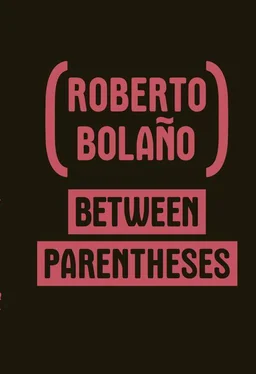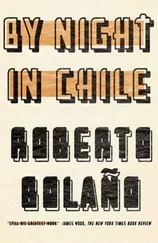Roberto Bolaño - Between Parentheses - Essays, Articles and Speeches, 1998-2003
Здесь есть возможность читать онлайн «Roberto Bolaño - Between Parentheses - Essays, Articles and Speeches, 1998-2003» весь текст электронной книги совершенно бесплатно (целиком полную версию без сокращений). В некоторых случаях можно слушать аудио, скачать через торрент в формате fb2 и присутствует краткое содержание. Год выпуска: 2011, Издательство: New Directions, Жанр: Публицистика, Критика, на английском языке. Описание произведения, (предисловие) а так же отзывы посетителей доступны на портале библиотеки ЛибКат.
- Название:Between Parentheses: Essays, Articles and Speeches, 1998-2003
- Автор:
- Издательство:New Directions
- Жанр:
- Год:2011
- ISBN:нет данных
- Рейтинг книги:4 / 5. Голосов: 1
-
Избранное:Добавить в избранное
- Отзывы:
-
Ваша оценка:
- 80
- 1
- 2
- 3
- 4
- 5
Between Parentheses: Essays, Articles and Speeches, 1998-2003: краткое содержание, описание и аннотация
Предлагаем к чтению аннотацию, описание, краткое содержание или предисловие (зависит от того, что написал сам автор книги «Between Parentheses: Essays, Articles and Speeches, 1998-2003»). Если вы не нашли необходимую информацию о книге — напишите в комментариях, мы постараемся отыскать её.
The Savage Detectives
Between Parenthese
Between Parentheses: Essays, Articles and Speeches, 1998-2003 — читать онлайн бесплатно полную книгу (весь текст) целиком
Ниже представлен текст книги, разбитый по страницам. Система сохранения места последней прочитанной страницы, позволяет с удобством читать онлайн бесплатно книгу «Between Parentheses: Essays, Articles and Speeches, 1998-2003», без необходимости каждый раз заново искать на чём Вы остановились. Поставьте закладку, и сможете в любой момент перейти на страницу, на которой закончили чтение.
Интервал:
Закладка:
I walked him outside. When he was out of sight I thought of the invisible man, but a few seconds later, as I turned and went back into the bar, it hit me that Aspurúa wasn’t the type, and that in fact all his mannerisms, all his shyness, even his reserve, indicated a man who was fully conscious, maybe painfully conscious, of his visibility and the visibility of others. In this sense, I thought, though I thought this much later, maybe on the plane back to Spain, books — the books that he always read with such enthusiasm, an enthusiasm in which one could glimpse the adolescence that never abandons some old people — were like aspirin for a headache or like the opaque sunglasses that some madmen wear to block out everything and find peace, because the truth, experienced day by day as visibility, is exhausting and draining and sometimes brings on madness. Maybe that was his relationship to books. Or maybe not. Maybe what he expected from books, as I’d like to believe now that he’s dead, was messages in a bottle or hard drugs or windows through which, on rare occasions, one sees Alice’s white rabbit skim past like a lightning bolt.
According to Braithwaite, who was at his funeral, at some point a rabbit really did run between the gravestones. Not a white rabbit but a gray or brown one, maybe a hare, though from the same family in the end.
THE REAL WAY TO GET TO MADRID
Of the many ways to get to Madrid, my favorite is hitchhiking, like when I was Poil de Carotte, in the melancholy words of Renard in his Journal , the time he wet his bed just a little because he was sick and nothing could ever be right again, if it’s possible to wet one’s bed just a little in a world (and in a bed, which is the flip side of the coin on which the metaphor of the world is etched) where the density of voluntary and involuntary acts is anything but sleep or desire, but instead a tangible and in some way irremediable reality: a yellow liquid that runs down your leg, a liquid that the French author, Schwob’s great friend, observes with curiosity and indifference, reminded of himself as a boy, and also of himself as written by himself but so long ago now.
Of the many hotels in Madrid, I prefer the ones between the Plaza de Santa Ana and the Plaza de Lavapiés. Just like when I used to hitchhike and I could go for days without eating or sleeping. Although I’m acquainted with better hotels, like the Wellington, for example, which is the hotel where one day I saw the Baroness von Thyssen sitting alone in the lobby, wrapped in a white fur coat as if it were a shield or the kind of rough quilt that bums and the homeless use to protect themselves from the elements in winter, her look rapidly morphing from baroness to commoner.
When you think about it, living in Madrid or being there isn’t much different from living or being in Tacuarembó. The air, maybe, is different. It’s so clear that sometimes it blinds the soul, allowing us to see more clearly: the notional streets and the Castilian Spanish, the kind of slang they speak so well in the old capital of the mother country.
And the women, the native daughters of Madrid, the blondes and the brunettes, add mystery to a place already rich in mystery, although it’s well known that the Spanish, like Latin Americans, aren’t just poorly educated but also no good in bed. That’s the source of the look one sees in the eyes of the women of Madrid: part sarcasm and part Merimée.
The truth is that Madrid is a city that doesn’t exist — despite the warriors and priests who left the capital and never came back, despite the women of Madrid, melancholy and practical in the meseta’s least pragmatic region.
Or maybe Madrid is an imaginary city, to which one has to hitchhike, not fly, and to which one can only come when one is twenty-five, not nearly fifty.
THE BUKOWSKI OF HAVANA
To call someone the Bukowski of Havana might even be flattering in a way, more of a compliment than an insult, but to say such a thing about a writer, a Cuban writer, I don’t know, it could be taken as an open or veiled expression of contempt, because Bukowski, who was an excellent poet, a drunken poet shaped by the reading of bad translations of Li Po, another legendary drunk, has fallen into discredit in recent years, which is something that for the most part seems unfair, since even if he never really shone as a novelist, as a writer of short stories in a tradition that stretches from Twain to Ring Lardner he’s the author of some notable works.
The critics call Pedro Juan Gutiérrez the Bukowski of Havana, and in fact the Cuban writer and the American writer have a number of things in common: a lifetime of odd jobs, most seemingly unrelated to literature; belated success; a simple style of writing (although here one has to be very careful); shared subjects like women, alcohol, and the struggle to live just one more week. Also, like Bukowski’s, Gutiérrez’s novels are notably inferior to his stories.
Simply put, Pedro Juan isn’t taken seriously, which is something that I imagine he couldn’t care less about, since on the one hand he’s used to not being taken seriously and on the other hand I don’t think that’s quite what he wants anyway. His public image couldn’t be more contradictory: there are those who see him as the ultimate priapic figure, the authentic Caribbean goods. In this sense Gutiérrez is like an unchained sexual Prometheus. His attraction to women knows neither age (though certainly no one has ever claimed he was a pedophile; on the contrary) or race (Gutiérrez flies the rainbow flag), or personal grudges (he could fall in love with the worst hellcats on Earth). I know readers who ask where this satyr finds the time to write, since he seems to be fucking all day long. I also know readers who think that Gutiérrez is a spy for Castro’s regime and that his books are written by a team of literary commissars while he carries out his espionage duties. Castro’s secret police would have to be truly deranged to invent a writer like this.
In Gutiérrez’s stories, besides sex, drugs, and the survival instinct, the protagonist is Havana. A pitiful Havana in a state of coma, where the Revolution isn’t even a joke anymore. Actually, Gutiérrez’s Havana isn’t comatose; it’s anemic and feverish. Bucharest and Kiev or Sofia were comatose. But the fragility of the citizens of Havana resembles the fragility of the citizens of those formerly communist cities and also is not much different from the fragility of the citizens of any other big city in Latin America. Gutiérrez’s stories, in this sense, insert themselves into the chaos of history (and not just into the chaos of the stories of individuals), and though Gutiérrez may be the Bukowski of Havana, they’re more real and authentic and often much better written than the stories of authors dubbed serious by the critics, authors who are still struggling in the increasingly pestilent waters of the Boom, to give an example close to home, or who try, usually pathetically, to cross-dress in the garb of mandarin aloofness and aristocracy on a continent where there is no aristocracy and where the most terrible things happen inches from our wan faces (if they can be called faces).
Cuba is in bad shape. Latin America is in bad shape. Gutiérrez doesn’t seem to be in much better shape. But I fear he remains faithful to his principles or to his nature. Whoever wants to judge for himself should read Dirty Havana Trilogy or the three paperback volumes in which Anagrama has collected all of his published stories.
SERGIO GONZÁLEZ RODRÍGUEZ IN THE EYE OF THE STORM
A few years ago, my friends in Mexico got tired of me asking for information — more and more detailed information, too — about the killings of women in Ciudad Juárez, and they decided, apparently by common accord, to hand the job over to Sergio González Rodríguez, who is a novelist, essayist, reporter, and probably all kinds of other things besides, and who, according to my friends, was the person who knew most about this case, a unique case in the annals of Latin American crime: more than three hundred women raped and killed in an extremely short period of time, between 1993 and 2002, in a city on the U.S. border with a population of just under one million.
Читать дальшеИнтервал:
Закладка:
Похожие книги на «Between Parentheses: Essays, Articles and Speeches, 1998-2003»
Представляем Вашему вниманию похожие книги на «Between Parentheses: Essays, Articles and Speeches, 1998-2003» списком для выбора. Мы отобрали схожую по названию и смыслу литературу в надежде предоставить читателям больше вариантов отыскать новые, интересные, ещё непрочитанные произведения.
Обсуждение, отзывы о книге «Between Parentheses: Essays, Articles and Speeches, 1998-2003» и просто собственные мнения читателей. Оставьте ваши комментарии, напишите, что Вы думаете о произведении, его смысле или главных героях. Укажите что конкретно понравилось, а что нет, и почему Вы так считаете.












